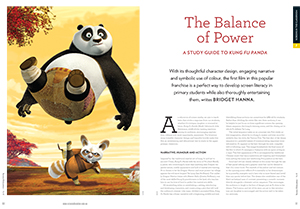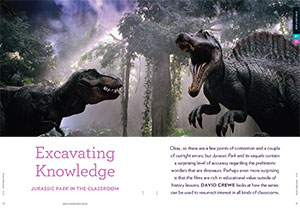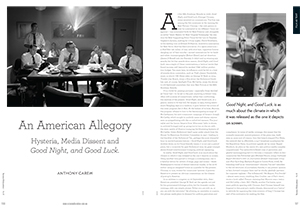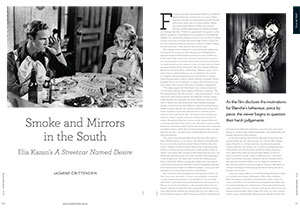| |
|
Screen Education magazine
Call for writers / call for papers
|
| |
|
|
|
|
|
|
|
Are you a primary or secondary teacher with a great approach to using screen-based media in your classroom? Are you an academic with an interest in media literacy and education? Are you a writer with a proven background in film, television and media? We want your pitches!
We at Screen Education magazine are currently seeking content for our upcoming issues. We welcome former and current writers, as well as new contributors. Unsolicited submissions or article proposals are always gladly considered.
Screen Education is a partially refereed journal and we are therefore also interested in research articles from academics on areas of media teaching and learning. If you have a proposal, please send an abstract.
Listed below are the kinds of topics and texts we are looking for content on. But first – the fine print:
- If you wish to contribute, please contact Greta Parry at screen_ed@atom.org.au.
PLEASE DO NOT REPLY DIRECTLY TO THIS EMAIL.
- Please include a description of the article(s) you are proposing and outline any relevant experience you may have in relation to the topic. If you are a new contributor, please also include a brief bio and a writing sample. Due to an expected high number of responses, there may be a delay before we are able to respond your proposal; we can only respond to successful pitches/submissions.
- Pay rates and submission guidelines are available on our website: www.metromagazine.com.au/writers.html.
Feature articles
The following list of topics is by no means exhaustive, and can be adapted, changed and – hopefully – greatly extended. For a sense of the kinds of themes and topics that Screen Education covers, visit www.screeneducation.com.au.
Some topics and texts we are currently prioritising are:
- Cleverman and Indigenous representation;
- Hunt for the Wilderpeople;
- Pieces on using games in classrooms / the educational value of games;
- Muslim and/or Middle-Eastern representation in popular media.
Other topics we are always interested in include:
Media-specific topics
- Lesson plans and units of work for the Media classroom (primary and secondary) on media literacy/multiliteracies
- Discussions and teaching guides for feature films, documentaries and series with relevance to Media classrooms at both primary and secondary levels
- Teaching units relating to media influence, including the effects of texts on audiences and society
- Teaching units relating to communication theories and models
- New trends in the Media classroom and curriculum, such as the new VCE Media study design
- Using magazines, comics, graphic novels, zines and newspapers in the classroom
- Teaching storytelling skills in the primary or secondary classroom
- Teaching technical skills related to media production in the primary or secondary classroom
- Teaching multimedia
- Reviews and discussion of educational apps for smartphones and tablets (iOS, Android) and desktop devices as well as web-based media applications and games
- Discussion of new media technology such as streaming services, social media, healthy internet use, etc.
- Using animation in the classroom
- Experimental cinema
- Teaching units relating to analysing posters, trailers, video clips, websites, DVD/Blu-ray covers and soundtracks
- Major factors in choosing film texts – a guide to choosing the right texts
- Interviews with media industry practitioners about what they do and how they got to where
they are
- Commercial, popular TV, especially reality shows such as talent quests, real estate / home improvement shows, etc.
- Teen films
- Censorship, classification, transgression, boundaries
- Minority representation in popular media (female, trans, queer, non-white, etc.)
- Technical analyses and/or ‘insider’ articles on making ads – visual and narrative techniques for convincing and selling
- The implications of the digitisation of photography (including retouching, etc.)
Using screen-based media in other subjects
- Discussions and teaching guides for feature films, documentaries and series with relevance to English classrooms at both primary and secondary levels (e.g. recent literary adaptations)
- Discussions and teaching guides for feature films, documentaries and series with relevance to all other learning areas (e.g. History, Science) at both primary and secondary levels (e.g. recent documentaries; visual-media resources)
|
| |
 |
|
|
|
 |
| |
|
‘Talking Society’ pieces
This section presents feature articles that aim to help teachers use feature films, documentaries and series to discuss social issues in the classroom. We are interested in articles aimed at primary and/or middle years and/or senior secondary teachers. Some of the topics we are interested in covering (though this is not an exhaustive list by any means) are:
|
- mental illness
- LGBTIQ issues
- gender labels
- alcohol/drug (ab)use
- bullying
- suicide
- climate change
- environment/sustainability
- poverty
|
|
- housing issues / homelessness
- domestic violence
- migrants/otherness
- refugee crises in Australia and abroad
- disability
- religion/s
- class
|
|
- Indigenous rights/recognition
- systems of government
- capitalism / consumerism / global economics
- crime and law
- the politics of war/terrorism
|
|
Film suggestions
Some films that are currently used in primary and middle years classrooms, and which may fit into one or more of the above categories (media-specific topics, non-media subjects, Talking Society pieces), include:
|
- Apollo 13
- Babe
- Be My Brother
- Becoming Jane
- Birthday Boy
- The Book Thief
- Bran Nue Dae
- Bride and Prejudice
- Careful, He Might
Hear You
- Chariots of Fire
- Chicken Run
- Cracker Bag
- The Cup (Phörpa)
- The Dark Crystal
- Edward Scissorhands
- Extremely Loud & Incredibly Close
- E.T. the Extra-Terrestrial
- Ever After
|
|
- Fairy Tale: A True Story
- Finding Neverland
- Fly Away Home
- The Help
- Harry Potter and the Philosopher’s Stone
- Hugo
- The Importance of
Being Earnest
- Kangaroos, Faces in the Mob
- The Karate Kid
(dir. Harald Zwart)
- The Kite Runner
- Kubo and the Two Strings
- Kundun
- Lousy Little Sixpence
- Mabo: Life of an Island Man
|
|
- Mad Hot Ballroom
- March of the Penguins
- A Midsummer Night’s Dream
(dir. Michael Hoffman)
- Much Ado About Nothing (dir. Kenneth Branagh)
- The NeverEnding Story
- Outback
- Il Postino
- The Princess Bride
- Ralph
- Red Dog
- The Sapphires
- Shrek
- Stand and Deliver
- Utopia
- Whale Rider
- Who Framed Roger Rabbit
|
|
Television suggestions
We welcome pitches on television series that can be used in primary and/or secondary classrooms. Some ideas include:
|
- Black Mirror
- Degrassi: The Next Generation
- The Family Law
- Fresh off the Boat
|
|
- Here Come the Habibs!
- The Kettering Incident
- Mad Men
- Modern Family
- Nowhere Boys
|
|
- Ready for This
- Reality TV shows
- Redfern Now
- Tomorrow When the War Began
|
|
Filmmaker profiles
This section presents comprehensive pieces that focus on prolific directors/filmmakers, analysing work from their oeuvre in a way that will be useful to Media teachers. Some of the many filmmakers we would like to cover include:
|
- Woody Allen
- James Cameron
- Jane Campion
- Francis Ford Coppola
- Clint Eastwood
- John Ford
- Jean-Luc Godard
|
|
- Alfred Hitchcock
- Peter Jackson
- Stanley Kubrick
- Akira Kurosawa
- Fritz Lang
- Spike Lee
- George Lucas
|
|
- Baz Luhrmann
- Ridley Scott
- Steven Spielberg
- Warwick Thornton
- The Wachowskis
- Orson Welles
|
|
Film as Text
We are interested in essays on any films that are being taught as texts in the English or Media senior secondary classrooms. These articles are approximately 2500 words long and provide close, detailed analysis of key themes and filmic techniques. We are seeking Film as Text articles on the following films, though other relevant texts will also be considered:
|
- 12 Years a Slave
- The 39 Steps
- 52 Tuesdays
- 20,000 Days on Earth
- The Accidental Tourist
- Across the Universe
- The Act of Killing
- The African Queen
- All Quiet on the
Western Front
- Amadeus
- Amazing Grace
- Amy (dir. Asif Kapadia)
- The Artist
- Atonement
- Avatar
- Baraka
- Beasts of the
Southern Wild
- A Beautiful Mind
- Being There
- Bend It Like Beckham
- Beneath Clouds
- The Big Chill
- Big Fish
- The Big Short
- Birdman
- The Black Balloon
- Blood Diamond
- Blue Valentine
- Bra Boys
- Bram Stoker’s Dracula (dir. Francis Ford Coppola)
- Bran Nue Dae
- Braveheart
- Breakfast at Tiffany’s
- Breathe
- Bridesmaids
- Butch Cassidy and
the Sundance Kid
- Careful, He Might Hear You
- Carol
- The Castle
- Catch-22
- The Chant of
Jimmie Blacksmith
- Chappie
- Chariots of Fire
- Children of Men
- Chinatown
- Citizen Kane
- Clueless
- The Color Purple
- Coming Home
- Cool Hand Luke
- Cosi
- The Counterfeiters
- Crouching Tiger,
Hidden Dragon
- Cry Freedom
- The Crying Game
- The Curious Case of Benjamin Button
- Dances With Wolves
- Dangerous Liaisons
- Dead Heart
- Dead Poets Society
- Deadpool
- Death at a Funeral
- The Descendants
- The Dish
- Dog Day Afternoon
- Don Jon
- Doubt
- Dr Strangelove
- Dr Zhivago
- An Education
- Elizabeth
- The English Patient
- Enter the Dragon
- Equus
- E.T. the Extra-Terrestrial
- The Eye of the Storm
- Fargo
- First Australians (documentary series)
|
|
- Fly Away Home
- Forrest Gump
- Four Weddings and a Funeral
- Fruitvale Station
- Galaxy Quest
- Gandhi
- The Gatekeepers
- A Girl Walks Home Alone at Night
- Girlfight
- Glengarry Glen Ross
- Gone with
the Wind
- Good Morning, Vietnam
- Gran Torino
- The Grapes of Wrath
- Great Expectations
(dir. David Lean)
- Groundhog Day
- Guardians of the Galaxy
- Guess Who’s Coming to Dinner?
- Hail, Caesar!
- Hamlet
(dir. Kenneth Branagh)
- Harold and Maude
- Hating Alison Ashley
- The Help
- Henry V
(dir. Kenneth Branagh)
- Hero
- The Hours
- The Hunger Games
- The Idol
- The Immigrant
- The Importance of Being Earnest
(dir. Oliver Parker)
- Ilo Ilo
- In the Name of
the Father
- Into the Wild
- Invictus
- Japanese Story
- JFK
- Juno
- The Killing Fields
- Kundun
- LA Confidential
- Last Cab to Darwin
- The Last Picture Show
- Lawrence of Arabia
- Les Misérables
(dir. Bille August)
- Les Misérables
(dir. Tom Hooper)
- Life, Animated
- Life of Pi
- Little Miss Sunshine
- The Lobster
- Locke
- Looking for Richard
- Lord of the Flies
- The Lord of the Rings (trilogy)
- Lore
- Lost in Translation
- Lousy Little Sixpence
- Love & Friendship
- Love Is Strange
(dir. Ira Sachs)
- Made in Dagenham
- Mary Shelley’s Frankenstein
(dir. Kenneth Branagh)
- M*A*S*H
- Mean Girls
- Metropolis
- Midnight Cowboy
- A Midsummer Night’s Dream
(dir. Michael Hoffman)
- Montana
- Monty Python and the Holy Grail
- Moolaadé
- Moonrise Kingdom
|
|
- The Mosquito Coast
- The Motorcycle Diaries
- Mulholland Drive
- Muriel’s Wedding
- My Brilliant Career
- My Year Without Sex
- Never Let Me Go
- A Night at the Opera
- Night Moves
(dir. Kelly Reichardt)
- Obvious Child
- One Flew Over the Cuckoo’s Nest
- Ordinary People
- Orlando
- A Passage to India
- Pete's Dragon
(dir. David Lowery)
- Philadelphia
- The Pianist
- The Piano
- Pleasantville
- Pretty Woman
- The Princess Bride
- The Queen
- Radiance
- Raiders of the Lost Ark
- Rebel Without a Cause
- Remember the Titans
- Red River
- The Revenant
- Romulus, My Father
- Room with a View
- The Royal Tenenbaums
- Run Lola Run
- Safety Not Guaranteed
- Samson & Delilah
- The Sapphires
- The Searchers
- Sense and Sensibility
(dir. Ang Lee)
- Seven Samurai
- Shane
- The Shawshank Redemption
- Shine
- Silver Linings Playbook
- The Sixth Sense
- Snowden
- Some Like It Hot
- Somersault
- The Spectacular Now
- Stagecoach
- Strictly Ballroom
- Sully
- The Sum of Us
- The Tempest
(dir. Julie Taymor)
- Ten Canoes
- Terms of Endearment
- Tiny Furniture
- To Kill a Mockingbird
- Tootsie
- Topsy-Turvy
- The Tree of Life
- Triumph of
the Will
- Tropic of Cancer
- True Grit
- Twilight
- Unforgiven
- The Untouchables
- W.
- WALL·E
- The Wave
- West Side Story
- What We Do in the Shadows
- When Harry Met Sally
- Who’s Afraid of
Virginia Woolf?
- Wild
(dir. Jean-Marc Vallée)
- The Year of Living Dangerously
- Yolngu Boy
- Zero Dark Thirty
|
| |
 |
|
|
|
 |
| |
| |
|
If you wish to contribute to Screen Education, please contact Greta Parry at screen_ed@atom.org.au.
PLEASE DO NOT REPLY DIRECTLY TO THIS EMAIL.
Submissions to Metro magazine
If you’re interested in pitching or submitting work to Metro, Australia’s most respected film and media magazine, then feel free to get in contact with editor Adolfo Aranjuez at metro@atom.org.au. See www.metromagazine.com.au/magazine/ for details.
PLEASE FORWARD THIS ON TO ANY COLLEAGUES WHO MIGHT BE INTERESTED
USING THE LINK AT THE VERY BOTTOM OF THIS EMAIL.
|
| |

   
|